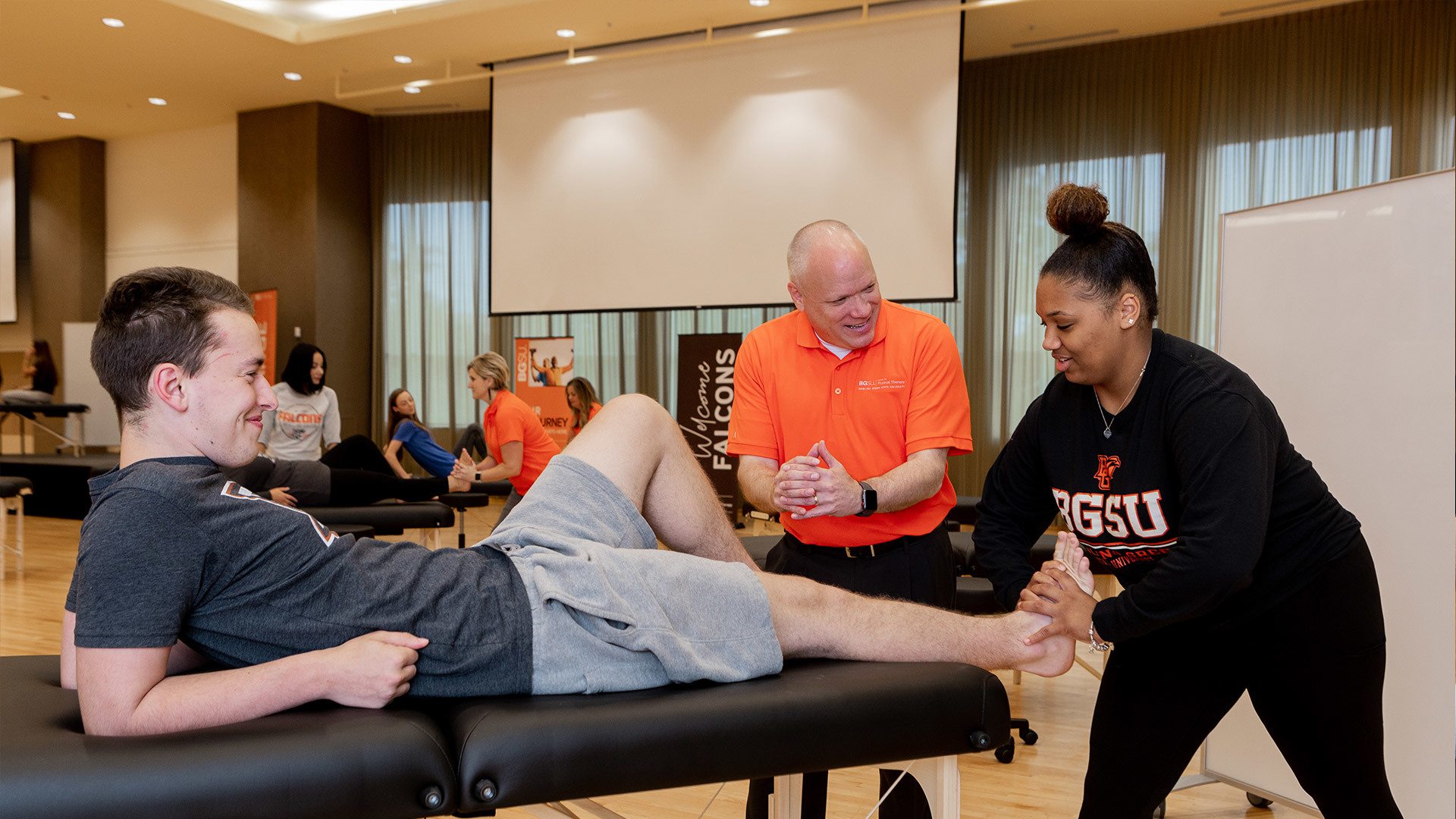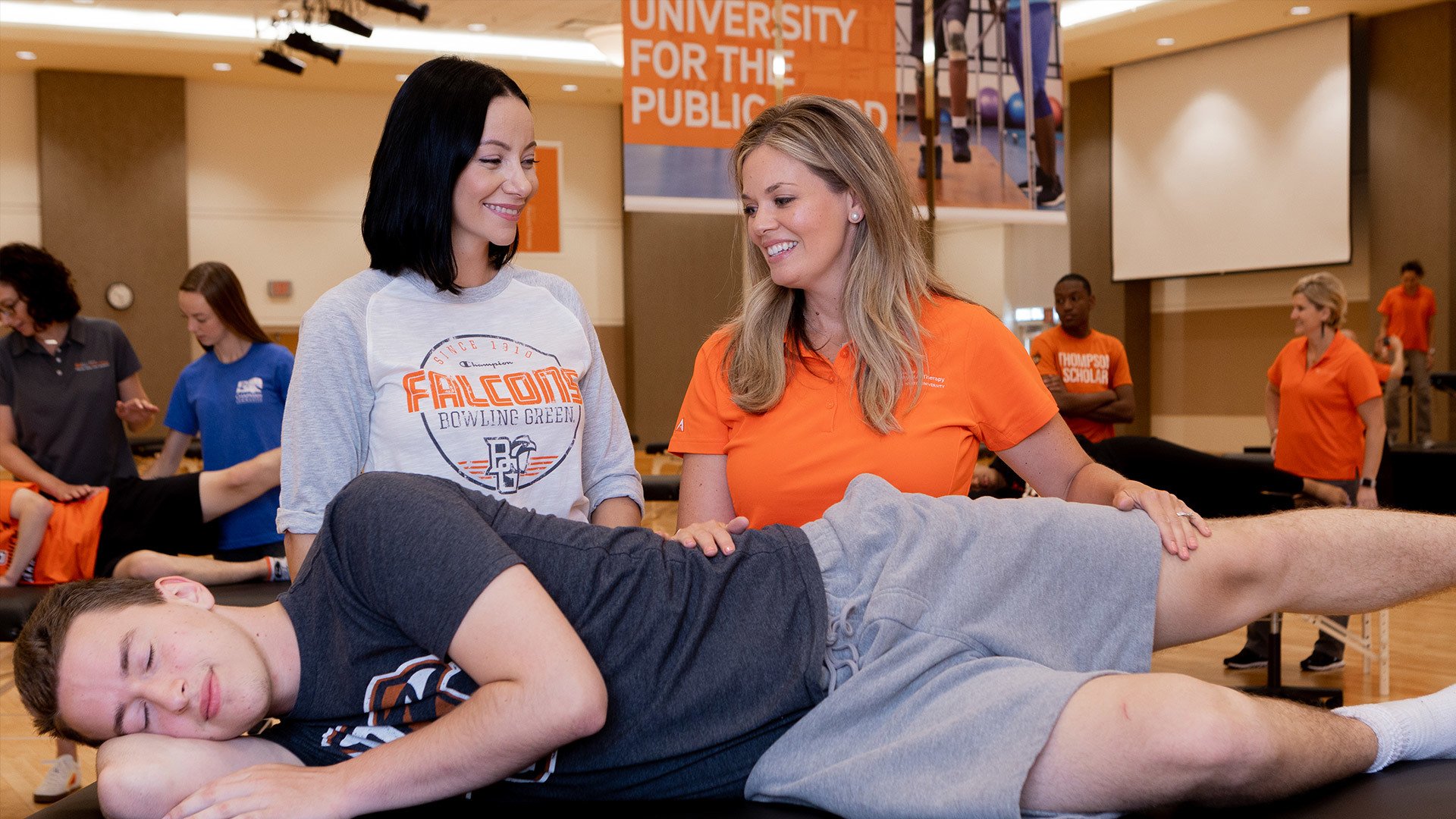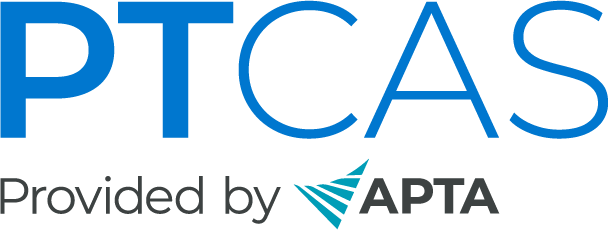Nationally recognized for student experience
The Wall Street Journal

Doctor of Physical Therapy (DPT)
Hybrid
Physical Therapy
Bowling Green State University’s Doctor of Physical Therapy (DPT) program is Ohio’s first and only public, accelerated, hybrid (online and in-person) DPT program.
In this blended learning program, you’ll earn your Doctor of Physical Therapy degree in seven semesters. After passing the NPTE licensure exam, you will emerge as a clinician with a strong foundation in clinical reasoning and evidence-based practice and be a valuable contributor to the interprofessional health care team.
BGSU DPT uses a holistic review strategy for admissions and recruitment, reducing barriers to the physical therapy profession. Bowling Green State University (BGSU)’s Doctor of Physical Therapy (DPT) program adheres to Non-Discrimination in Employment and Education policy established by the University. In consideration of this policy, persons with bachelor’s degrees from accredited institutions, who meet the pre-requisites established by BGSU’s DPT Program and demonstrate promising scholastic standing, along with professional potential, are considered for admission.
Our faculty support every student’s academic and career success. Our accelerated, hybrid-delivered DPT model means our graduates can enter the workforce and earn an income sooner than students in a traditional three-year DPT program.
The mission of BGSU’s DPT program is to develop Doctors of Physical Therapy who create positive change in the lives of their patients and communities. We achieve this by teaching competence, innovation, application, research and collaboration.
Our faculty, all renowned members of the physical therapy profession with a commitment to the education of the next generation of physical therapy professionals, have passionately and ardently created an intensive curriculum designed to challenge and empower BGSU DPT students.
DPT Informational Webinars
Learn about our seven-semester, accelerated, hybrid-delivered curriculum, as well as admissions requirements and accreditation standards for our program via one of our free monthly webinars from 6:30-7:30 p.m. EDT/EST. Find upcoming dates on the registration page.
Our Delivery Model: Accelerated + Hybrid
Accelerated Defined
This approach allows completion of the DPT degree requirements in seven semesters (versus the traditional three years, nine semesters) while meeting the established timing and content standards set by the Commission on Accreditation in Physical Therapy Education (CAPTE).
Hybrid Defined
BGSU DPT students experience the benefit of living anywhere in the country while still being a part of the BGSU community. The accelerated, hybrid DPT program infuses contemporary learning technologies and experiences into modern professional training for aspiring physical therapists. By combining the best practices of distance learning with live, face-to-face immersive lab experiential sessions, the student is prepared to grow through clinical experiences both in their respective community as well as at nationally recognized centers of health care.
How Hybrid?
Students come to the BGSU campus to learn psychomotor skills in lab immersions four times the first year of the program. BGSU DPT students engage with faculty and classmates in live virtual (synchronous) and online asynchronous course learning activities throughout the semester. During the second program year, students participate in clinical education internship experiences, continue to concurrently participate in live virtual and asynchronous coursework, and also come to campus for four lab immersions.
See our sample academic calendar. This learning and delivery model is highly collaborative, engaging and rigorous. The accelerated, hybrid curriculum requires the student to be a self-starter, highly organized, motivated and open to learning in new ways.
Creating Opportunity for All
BGSU’s School of Physical and Occupational Therapy is committed to establishing a supportive and welcoming community for all of its students, educators, and staff. Creating an environment where we are able to respectfully consider various perspectives, and how they apply to our curriculum and core values, will successfully prepare students to meet needs of the physical and occupational therapist workforce and patients they serve. We believe that communities are stronger by providing opportunity for all.
BGSU and the School of Physical and Occupational Therapy seek to create opportunity by empowering student success. Our programs are committed to addressing health disparities and social determinants of health. All BGSU DPT/OTD students will be introduced to issues related to healthcare in medically underserved areas. This service not only advances the core values of the profession but allows students to gain valuable educational experiences. Understanding the unique healthcare needs of various communities helps create public good.
#1 public university in Ohio for career prep
The Wall Street Journal
Career Outlook
BGSU DPT graduates will have the opportunity to practice across a spectrum of settings: outpatient clinics, hospitals, critical care units, people’s homes, schools, sports and fitness facilities and workplaces, to name a few.
The physical therapy profession is set to grow 18% from 2019- 2029, according to the Bureau of Labor Statistics – much faster than the average of 3% for all careers. An aging population and sedentary lifestyles are creating extra demand for qualified physical therapists. The median salary in the United States for a licensed physical therapist is $85,000. Salary and demand vary based on degree, location, position, years of experience and setting. Licensed physical therapists may choose to pursue a residency or fellowship program to enhance their knowledge and practice in a specialty practice area.
Career paths
- Neurological physical therapist
- Pediatric physical therapist
- Private practice PT
- Home services
- Geriatric PT
- Sports medicine
- Women’s health
- Cardiac rehabilitation
Quick Facts from the Bureau of Labor Statistics
Curriculum
Our body-systems aligned DPT curriculum is delivered across seven semesters, 108 weeks over 28 months using an accelerated, hybrid learning delivery model.
Approximately half of BGSU DPT’s curriculum is delivered online, with the remaining taking place in face-to-face lab immersion sessions and clinical education settings. Online instruction includes asynchronous multi-media content review, assignments and assessment learning activities combined with synchronous online classes and faculty office hours.
Attendance is required for weekly sync sessions during remote learning weeks. Students engage in approximately 6-8 hours of synchronous online learning a week, including exams, Monday- Friday between 10am EST and 5pm EST. Students should expect 30-40 hours of asynchronous learning per week. Attendance is required at face-to-face lab immersions and clinical education experiences. Given the demands of the accelerated delivery model, the program strongly recommends that students work no more than 10-12 hours/week.

Sample courses
- Clinical Neuroscience for the PT
- Pharmacology for the PT
- Movement Science
- Therapeutic Interventions
- Musculoskeletal Practice
#1 university in Ohio – big or small, public or private – students would choose again
The Wall Street Journal
BGSU Rehabilitative Science Service Scholars Program
This engaging, hands-on learning community offers students in the School of Physical and Occupational Therapy a unique opportunity to enhance their academic experience.
Currently open to students enrolled in the Doctor of Occupational Therapy (OTD) and Doctor of Physical Therapy (DPT) programs, this on-campus, 1-credit-hour elective is designed to complement the hybrid nature of these graduate programs by providing an in-person, small-group seminar format focused on applied research and service-learning projects.
Each week, students participate in experiential learning that involves research and literature reviews, data collection and analysis, community needs assessments and collaborative service initiatives. Participants can gain exposure to real-world challenges in the fields of physical and occupational therapy, while working on projects that benefit local populations.
It’s an opportunity for students to distinguish themselves professionally, strengthening their resumes with valuable service-learning experience that showcases leadership, research skills and community impact. It also offers a supportive community for hybrid students who want to experience a more traditional in-person learning environment.

The Doctorate of Physical Therapy program is part of the BGSU Graduate College and BGSU College of Health and Human Services
Accreditation
Bowling Green State University has obtained approval from the Ohio Department of Higher Education and regionally through the Higher Learning Commission (HLC) to offer the DPT degree.
The Doctor of Physical Therapy Program at Bowling Green State University is accredited by the Commission on Accreditation in Physical Therapy Education (CAPTE), 3030 Potomac Ave., Suite 100, Alexandria, Virginia 22305-3085; telephone: 703-706-3245; email: accreditation@apta.org; website: capteonline.org. If needing to contact the program or institution directly, please call 419-216-0002 or email dpt-admissions@bgsu.edu.
Request Information
Updated: 11/07/2025 01:15PM

